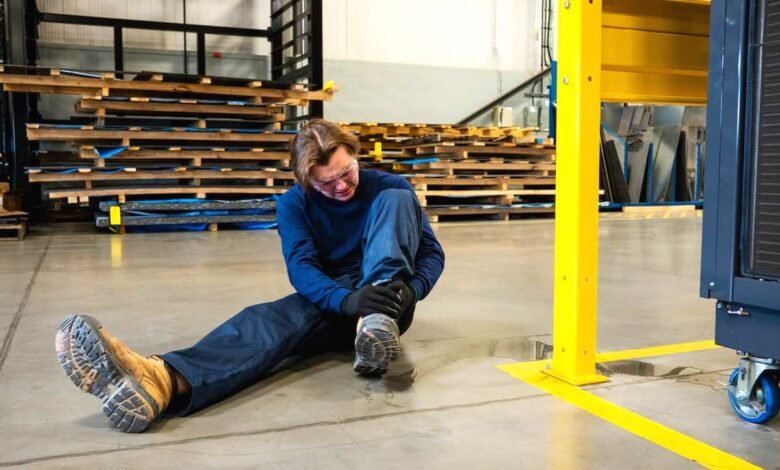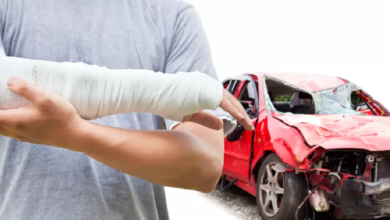Slip and Fall Injury Claims in Northern Ireland: Legal Timeline
This comprehensive guide outlines the process, key deadlines, and actionable steps for pursuing slip and fall injury claims in Northern Ireland.

Slip and fall injury claims in Northern Ireland are a vital avenue for individuals seeking compensation after accidents caused by unsafe conditions. These claims, often categorized under premises liability, arise when someone is injured due to negligence, such as a property owner failing to maintain a safe environment. Understanding the legal timeline for slip and fall injury claims is crucial to ensure you meet deadlines, gather evidence effectively, and maximize your chances of securing fair compensation. This comprehensive guide outlines the process, key deadlines, and actionable steps for pursuing slip and fall injury claims in Northern Ireland, optimized to help you navigate this complex legal landscape.
What Are Slip and Fall Injury Claims?
Slip and fall injury claims refer to personal injury cases where an individual suffers harm due to hazardous conditions on someone else’s property. Common scenarios include slipping on wet floors in supermarkets, tripping on uneven pavements, or falling due to poor lighting in public spaces. In Northern Ireland, these claims are governed by laws like the Occupiers’ Liability Act (Northern Ireland) 1957, which mandates that property owners ensure the safety of visitors. Slip and fall injury claims aim to compensate victims for medical expenses, lost wages, pain, and suffering caused by negligence.
Why Understanding the Legal Timeline Matters
The legal timeline for slip and fall injury claims in Northern Ireland is critical because missing deadlines, such as the limitation period, can bar you from seeking compensation, no matter how strong your case is. Acting promptly ensures that evidence remains fresh, witnesses are available, and your claim is processed efficiently. This article breaks down each stage of the timeline, offering insights into how long each step may take and what to expect when pursuing slip and fall injury claims.
Step 1: Immediate Actions After a Slip and Fall Accident (0–7 Days)
The first week after a slip and fall accident is pivotal for building a strong foundation for slip and fall injury claims. Taking immediate action helps preserve evidence and establishes a clear record of the incident.
Seek Medical Attention
Your health is the top priority. Even if injuries seem minor, visit a doctor or hospital as soon as possible. Some injuries, like concussions or soft tissue damage, may not be immediately apparent. Medical records serve as critical evidence in slip and fall injury claims, linking your injuries directly to the accident. Ensure the doctor documents all symptoms, diagnoses, and recommended treatments.
Report the Incident
Notify the property owner, manager, or responsible authority about the accident. For example, if you slipped in a shop, inform the store manager and request they complete an accident report. If the incident occurred in a public place, such as a council-maintained pavement, report it to the local authority. Obtain a copy of the report or confirmation of your notification, as this strengthens slip and fall injury claims by establishing an official record.
Gather Evidence
Collect evidence at the scene, if possible, to support your slip and fall injury claims. Key actions include:
- Photographs: Take pictures of the hazard (e.g., wet floor, uneven surface) and the surrounding area.
- Witness Details: Collect names and contact information of anyone who saw the accident.
- Personal Notes: Write down your recollection of the event, including the time, location, and conditions.
- CCTV Footage: Request access to any CCTV footage under the General Data Protection Regulation (GDPR), as you’re entitled to footage containing your image.
Preserving evidence early is essential, as hazards may be repaired or cleaned, weakening your slip and fall injury claims.
Consult a Solicitor
Contact a personal injury solicitor specializing in slip and fall injury claims within the first week. Many firms, like Paschal O’Hare Solicitors, offer free initial consultations to assess the viability of your case. A solicitor can guide you on next steps, explain your rights, and begin gathering additional evidence. Early legal advice ensures you don’t miss critical deadlines and strengthens your slip and fall injury claims.
Timeline Estimate: 0–7 days post-accident.
Step 2: Initial Consultation and Case Assessment (1–4 Weeks)
After immediate actions, the next phase involves a formal consultation with your solicitor to evaluate your slip and fall injury claims. This stage typically occurs within the first month.
Free Initial Consultation
Most solicitors in Northern Ireland provide a no-obligation consultation to discuss your slip and fall injury claims. During this meeting, you’ll provide details about the accident, injuries, and evidence collected. The solicitor will assess whether negligence can be established—i.e., whether the property owner failed in their duty of care. For example, if a shop failed to display a warning sign for a wet floor, this could constitute negligence.
Establishing Liability
To succeed in slip and fall injury claims, your solicitor must prove:
- Duty of Care: The property owner had a legal responsibility to ensure your safety.
- Breach of Duty: They failed to take reasonable steps to prevent the hazard.
- Causation: Their negligence directly caused your injuries.
- Damages: You suffered losses (e.g., medical costs, pain) as a result.
Your solicitor will review evidence, such as photos or witness statements, to build a case for liability.
Medical Assessment
Your solicitor may arrange for an independent medical assessment to evaluate the extent of your injuries. This report is crucial for slip and fall injury claims, as it quantifies the impact of your injuries and supports claims for compensation. The assessment may occur later, but planning begins during this phase.
Timeline Estimate: 1–4 weeks post-accident.
Step 3: Evidence Collection and Pre-Action Protocol (1–3 Months)
Once your solicitor confirms your slip and fall injury claims are viable, they’ll proceed with gathering comprehensive evidence and initiating the pre-action protocol, a formal process to notify the defendant.
Comprehensive Evidence Gathering
Your solicitor will collect additional evidence to bolster your slip and fall injury claims, including:
- Medical Records: Obtain detailed records from your doctor or hospital.
- Expert Reports: Engage engineers or safety experts to inspect the accident site and assess whether the property was maintained to a reasonable standard.
- Witness Statements: Formalize accounts from witnesses to corroborate your version of events.
- Financial Documents: Compile proof of losses, such as payslips for lost wages or receipts for medical expenses.
This phase ensures your slip and fall injury claims are supported by robust evidence, increasing the likelihood of a favorable outcome.
Letter of Claim
Under the Pre-Action Protocol for Personal Injury Litigation in Northern Ireland, your solicitor sends a Letter of Claim to the defendant (e.g., property owner or their insurer). This letter outlines:
- Details of the accident.
- Allegations of negligence.
- Nature and extent of your injuries.
- Estimated financial losses.
The defendant typically has 21 days to acknowledge the letter and three months to investigate and respond, admitting or denying liability. This step is critical for slip and fall injury claims, as it sets the stage for negotiations or court proceedings.
Timeline Estimate: 1–3 months post-accident.
Step 4: Negotiation and Settlement Attempts (3–12 Months)
Most slip and fall injury claims in Northern Ireland are settled out of court through negotiations, which begin after the defendant responds to the Letter of Claim.
Defendant’s Response
The defendant’s response determines the next steps for your slip and fall injury claims:
- Admission of Liability: If the defendant accepts responsibility, negotiations focus on the compensation amount.
- Denial of Liability: If liability is disputed, your solicitor may gather additional evidence or prepare for court.
- Partial Admission: In cases of contributory negligence (e.g., you were partially at fault), compensation may be reduced proportionately.
Compensation Valuation
Compensation for slip and fall injury claims includes:
- General Damages: For pain, suffering, and loss of quality of life, guided by the Guidelines for the Assessment of General Damages in Personal Injury Cases in Northern Ireland (Green Book). For example, minor injuries may yield up to £22,000, while severe injuries could reach £500,000.
- Special Damages: For financial losses, such as medical expenses, lost earnings, travel costs, and future care needs.
Your solicitor may use tools like compensation calculators to estimate potential payouts, but final amounts depend on negotiations.
Negotiation Process
Your solicitor negotiates with the defendant’s insurer to secure a fair settlement for your slip and fall injury claims. This process can take several months, especially if injuries are severe or liability is contested. If negotiations stall, your solicitor may recommend issuing court proceedings, though most cases (over 90%) settle before trial.
Timeline Estimate: 3–12 months post-accident, depending on complexity.
Step 5: Issuing Court Proceedings (12–18 Months)
If negotiations fail, your solicitor may file a lawsuit, marking a formal escalation of your slip and fall injury claims. This step is rare but necessary in complex or disputed cases.
Filing a Complaint
Your solicitor files a Writ of Summons or Statement of Claim in the appropriate court (e.g., County Court for claims under £30,000 or High Court for higher amounts). The complaint details the accident, negligence, injuries, and claimed damages. The defendant has 14–21 days to respond with a defense.
Discovery Phase
During discovery, both parties exchange evidence, including documents, witness statements, and expert reports. This phase ensures transparency and may reveal new information impacting your slip and fall injury claims. Discovery typically lasts 3–6 months.
Pre-Trial Preparations
Your solicitor prepares for trial by finalizing evidence, briefing witnesses, and consulting experts. They may also attend pre-trial hearings to resolve procedural issues. Many slip and fall injury claims settle during this phase, as both parties reassess their positions.
Timeline Estimate: 12–18 months post-accident, if court proceedings are necessary.
Step 6: Trial and Judgment (18–36 Months)
If your slip and fall injury claims proceed to trial, a judge will hear the case and deliver a judgment. Trials are uncommon, but preparation is essential.
Trial Process
Trials for slip and fall injury claims typically last 1–5 days, depending on complexity. Both sides present evidence, call witnesses, and make legal arguments. The judge determines:
- Whether the defendant was negligent.
- The extent of your injuries and losses.
- The appropriate compensation amount.
Judgment and Compensation
If the judge rules in your favor, they’ll award compensation, which may include general and special damages. If the defendant wins, you may receive nothing and could be liable for their legal costs, though this is rare in Northern Ireland due to ethical fee arrangements. Appeals are possible but uncommon.
Timeline Estimate: 18–36 months post-accident, for cases reaching trial.
Key Deadlines for Slip and Fall Injury Claims
The primary deadline for slip and fall injury claims in Northern Ireland is the limitation period, set by the Limitation (Northern Ireland) Order 1989.
Standard Limitation Period
You have three years from the date of the accident to issue court proceedings for slip and fall injury claims. Missing this deadline typically bars you from claiming, even if your case is strong.
Exceptions to the Limitation Period
- Minors: For individuals under 18, the three-year period begins on their 18th birthday, giving them until age 21 to file slip and fall injury claims.
- Mental Incapacity: If the injured person lacks mental capacity, the limitation period may be paused or extended.
- Date of Knowledge: If injuries become apparent later, the three-year period starts from the date you became aware of the injury.
Consult a solicitor promptly to confirm how these rules apply to your slip and fall injury claims.
Factors Affecting the Timeline
Several factors influence how long slip and fall injury claims take to resolve:
- Injury Severity: Severe injuries requiring long-term treatment or rehabilitation extend the timeline, as solicitors wait for a full prognosis.
- Liability Disputes: If the defendant denies responsibility, additional evidence or court proceedings may be needed.
- Evidence Availability: Missing evidence, like CCTV footage, can delay slip and fall injury claims.
- Defendant Cooperation: Insurers who negotiate in good faith can expedite settlements.
- Court Backlogs: If a trial is required, court schedules may cause delays.
On average, straightforward slip and fall injury claims settle within 6–18 months, while complex cases may take 2–3 years.
Compensation Amounts for Slip and Fall Injury Claims
Compensation for slip and fall injury claims varies based on injury severity and financial losses. Examples include:
- Minor Injuries: £1,000–£22,000 (e.g., sprains, bruises recovering within six months).
- Moderate Injuries: £22,000–£45,000 (e.g., fractures requiring surgery).
- Severe Injuries: £45,000–£500,000 (e.g., spinal injuries causing permanent disability).
Solicitors use the Green Book and case law to estimate payouts, ensuring slip and fall injury claims reflect the true impact of your injuries.
Choosing the Right Solicitor for Slip and Fall Injury Claims
Selecting an experienced solicitor is critical for successful slip and fall injury claims. Look for:
- Specialization: Choose a firm with expertise in personal injury law, like Reid Black or JMK Solicitors.
- Reputation: Check client reviews on platforms like Trustpilot or accreditations from the Association of Personal Injury Lawyers (APIL).
- Transparency: Ensure the solicitor explains costs upfront. Note that “No Win, No Fee” agreements are illegal in Northern Ireland, but ethical alternatives exist.
- Accessibility: Opt for a solicitor offering free consultations and regular updates.
A skilled solicitor streamlines the process, maximizing compensation for your slip and fall injury claims.
Common Challenges in Slip and Fall Injury Claims
Pursuing slip and fall injury claims can involve obstacles, such as:
- Contributory Negligence: If you were partially at fault (e.g., not watching where you were going), compensation may be reduced.
- Lack of Evidence: Without photos or witnesses, proving negligence is harder.
- Defendant Denials: Property owners may argue they took reasonable steps to prevent accidents.
- Emotional Barriers: Some victims hesitate to claim due to embarrassment or fear of legal costs.
An experienced solicitor can overcome these challenges, ensuring your slip and fall injury claims succeed.
Practical Tips for Success
To enhance your slip and fall injury claims, follow these tips:
- Act Quickly: Contact a solicitor and report the incident immediately.
- Document Everything: Keep records of medical visits, expenses, and correspondence.
- Avoid Early Settlements: Don’t accept quick offers from insurers without legal advice, as they may undervalue your claim.
- Stay Informed: Ask your solicitor for regular updates on your slip and fall injury claims.
Conclusion
Slip and fall injury claims in Northern Ireland offer a pathway to justice for those injured due to negligence. By understanding the legal timeline—from immediate actions to potential trials—you can navigate the process with confidence. Key steps include seeking medical attention, gathering evidence, consulting a solicitor, and meeting the three-year limitation period. With the right legal support, you can secure fair compensation for your injuries, whether through settlement or court judgment. If you’ve been injured in a slip and fall accident, don’t delay—contact a personal injury solicitor today to protect your rights and start your slip and fall injury claims.











